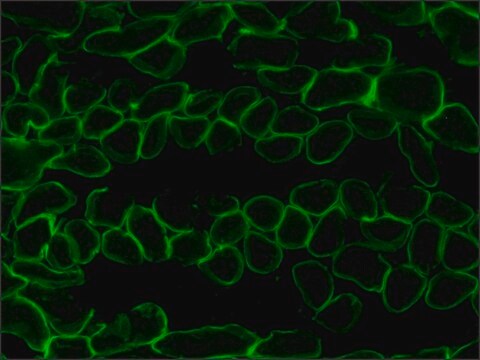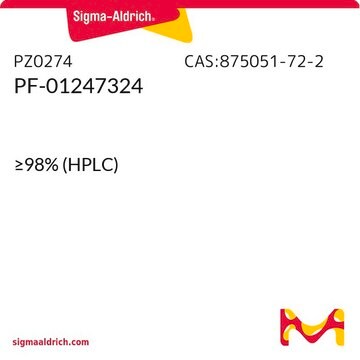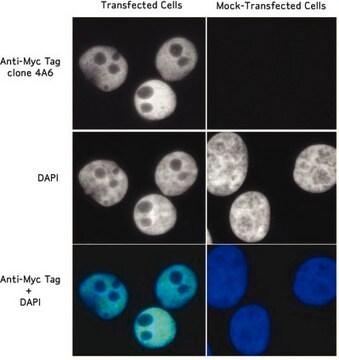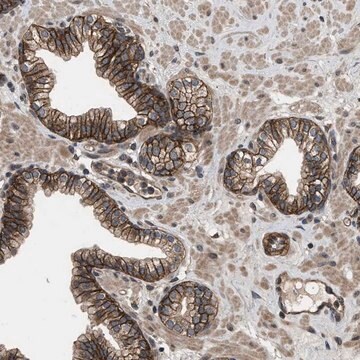ABN1739M
Anti-Utrophin A
from rabbit
Synonym(s):
UTRN A
About This Item
IHC
WB
immunohistochemistry: suitable (paraffin)
western blot: suitable
Recommended Products
biological source
rabbit
Quality Level
antibody form
affinity isolated antibody
antibody product type
primary antibodies
clone
polyclonal
species reactivity
human, mouse
packaging
antibody small pack of 25 μg
technique(s)
immunofluorescence: suitable
immunohistochemistry: suitable (paraffin)
western blot: suitable
isotype
IgG
NCBI accession no.
UniProt accession no.
target post-translational modification
unmodified
Gene Information
human ... UTRN(7402)
General description
Specificity
Immunogen
Application
Immunofluorescence Analysis: A representative lot detected Utrophin A in quadriceps transverse sections in transgenic mice (Adams, M.E., et. al. (2010). J Neurosci. 30(33):11004-10).
Immunohistochemistry Analysis: A representative lot detected Utrophin A in frozen sections of the gastrocnemius muscles (Banks, G.B., et. al. (2014). PLoS Genet. 10(6):e1004431).
Western Blotting Analysis: representative lot detected Utrophin A in whole muscle lysates (Banks, G.B., et. al. (2014). PLoS Genet. 10(6):e1004431).
Western Blotting Analysis: A representative lot detected Utrophin A in muscle membrane extracts from mdx mice (Courtesy of Dr Marvin Adams at University of Washington).
Immunofluorescence Analysis: A representative lot detected Utrophin A in mouse neuromuscular junction (Courtesy of Dr Marvin Adams at University of Washington).
Neuroscience
Quality
Immunohistochemistry Analysis: A 1:50 dilution of this antibody detected Utrophin A in human prostate tissue.
Target description
Physical form
Storage and Stability
Other Notes
Disclaimer
Not finding the right product?
Try our Product Selector Tool.
Storage Class Code
12 - Non Combustible Liquids
WGK
WGK 2
Flash Point(F)
does not flash
Flash Point(C)
does not flash
Regulatory Listings
Regulatory Listings are mainly provided for chemical products. Only limited information can be provided here for non-chemical products. No entry means none of the components are listed. It is the user’s obligation to ensure the safe and legal use of the product.
JAN Code
ABN1739-25UG:
ABN1739:
Certificates of Analysis (COA)
Search for Certificates of Analysis (COA) by entering the products Lot/Batch Number. Lot and Batch Numbers can be found on a product’s label following the words ‘Lot’ or ‘Batch’.
Already Own This Product?
Find documentation for the products that you have recently purchased in the Document Library.
Our team of scientists has experience in all areas of research including Life Science, Material Science, Chemical Synthesis, Chromatography, Analytical and many others.
Contact Technical Service








